What manners!
 Thursday, November 29, 2012 at 8:56PM
Thursday, November 29, 2012 at 8:56PM
He ought to be ashamed of himself, sitting in that section.
 Anpan Man,
Anpan Man,  Anpanman,
Anpanman,  Baikin Man,
Baikin Man,  Baikinman,
Baikinman,  Japanese trains in
Japanese trains in  Japanese Pop Culture,
Japanese Pop Culture,  Off Beat
Off Beat

 Thursday, November 29, 2012 at 8:56PM
Thursday, November 29, 2012 at 8:56PM
He ought to be ashamed of himself, sitting in that section.
 Tuesday, November 27, 2012 at 11:18AM
Tuesday, November 27, 2012 at 11:18AM
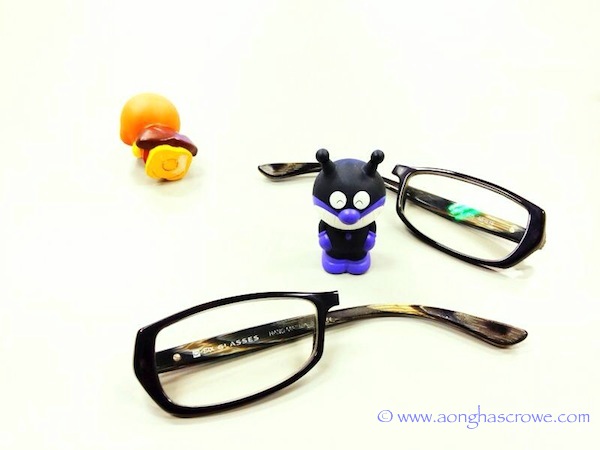
Looks like I'm going to have to change my profile photo now.
 Baikin Man in
Baikin Man in  Japanese Pop Culture,
Japanese Pop Culture,  Off Beat
Off Beat  Saturday, November 10, 2012 at 10:36AM
Saturday, November 10, 2012 at 10:36AM
 I find it hard to believe that Californians voted down (53.1% to 46.9%) Proposition 37, also called the Right to Know Initiative, which would have mandated labels--as is done in 61 other countries--indicating whether your food had been genetically engineered.
I find it hard to believe that Californians voted down (53.1% to 46.9%) Proposition 37, also called the Right to Know Initiative, which would have mandated labels--as is done in 61 other countries--indicating whether your food had been genetically engineered.
You'd think common sense would prevail. In the end, however, dollars and cents to the tune of over $60 million from the usual suspects--Monsantos, DuPont, DOW, Pepsi, Coca Cola, ConAgra Foods, Nestlé, and so on--did.
Makes you wonder what PepsiCo is trying to hide in its products, such as Quaker Oats, Frito Lays, Doritos, Aunt Jemima pancakes, Cracker Jacks . . . The list of possibly tainted "foods" goes on and on and on and on.
I suppose the logical conclusion the consumer could make from PepsiCo and other company's defense of GMOs is that ALL their products now contain genetically modified ingredients.
 Friday, November 9, 2012 at 11:35PM
Friday, November 9, 2012 at 11:35PM
 You may be asking why it took so long to count the votes in the Sunshine State.
You may be asking why it took so long to count the votes in the Sunshine State.
 Friday, November 9, 2012 at 8:50AM
Friday, November 9, 2012 at 8:50AM
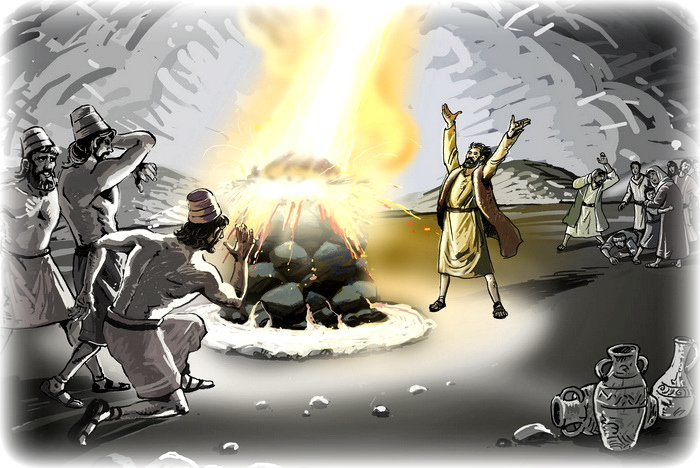 Considering that the Mormons of the world were most likely united in prayer on election day, does Obama's defeat of Bishop Romney mean that the God of Black Liberation Theology is stronger than the Godhead of Mormonism?
Considering that the Mormons of the world were most likely united in prayer on election day, does Obama's defeat of Bishop Romney mean that the God of Black Liberation Theology is stronger than the Godhead of Mormonism?
 Wednesday, November 7, 2012 at 7:02AM
Wednesday, November 7, 2012 at 7:02AM
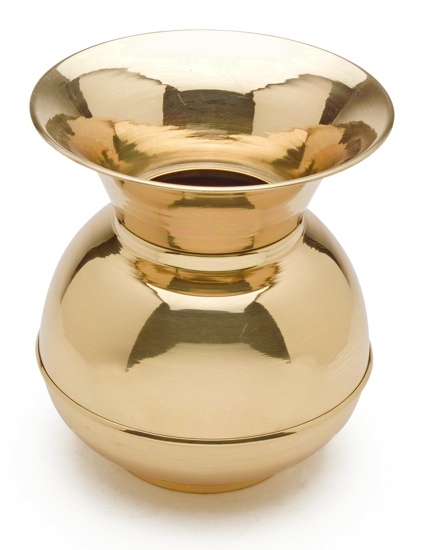 The Associated Press reports that an election worker in Alabama is under criminal investigation for vote rigging.
The Associated Press reports that an election worker in Alabama is under criminal investigation for vote rigging.
While many Americans are casting paper or electronic ballots today, in many rural counties in southern states, voters still spit into one of two spittoons (red or blue) to indicate their preference. Volume of spittle is measured at the end of the day to determine the winner.
Conecuh County spokesman Jim Bob Heidler said in a press release that Baylee Ann Thompson was "immediately relieved of duty after the alleged electoral spittoon tampering was discovered".
Sources familiar with the incident say their understanding is that the woman kicked over a blue spittoon that was half full of warm "votes" for Obama after a large group of "colored voters" had cast their "ballots".
When Ms Thompson was contacted by AP for comment, she tearfully insisted that it had “only been two ounces” that had been spilt. If convicted of a Class C felony for ballot tampering, Thompson could face up to five years in prison and a fine of up to $125,000.
 Wednesday, October 31, 2012 at 11:06AM
Wednesday, October 31, 2012 at 11:06AM
 The two of you who follow this blog might be wondering why I haven’t been posting recently. You might even suspect that I may have been stricken with, alas, writer’s block. There are a number of reasons why I haven’t been posting, but none of them, fortunately, have to do with being creatively clogged up.
The two of you who follow this blog might be wondering why I haven’t been posting recently. You might even suspect that I may have been stricken with, alas, writer’s block. There are a number of reasons why I haven’t been posting, but none of them, fortunately, have to do with being creatively clogged up.
The first is the impending arrival of my second son. (Another boy!) This pregnancy has been much harder on my wife than the first. While she believes it is due to her age (she’s not that old[1]), I think it is more related to the fact that, unlike the first time around when she filled her days by taking long naps and leisurely walks, she now spends most of her days frantically chasing after a tyrannical two-ear-old. Eight months pregnant and she’s only gained two kilos (4.4lbs). The nurses at her clinic praised her ability to keep her weight down during the pregnancy, but the two of us well know willpower has had nothing to do with it.
In order to help reduce the burden of housework and childcare, I have had to take on a number of responsibilities such as bathing my son and putting him to sleep (which usually means that I nod off, too), attending to him throughout the night, taking care of him in the morning, and so on. I don’t mind doing this—I wish I had more time to spend with the boy. But, it has meant that the things I should be doing first—namely writing—are done much later and often not at all.
When I have had the time to write, much of it has been spent hammering out a new query and synopsis for Rokuban – No.6. Pure drudgery it is!
I’m the type of person who can normally write and write and write if interested in or enjoying what I am writing, but can get thoroughly stopped up when it comes to writing something I have to write. (That’s one reason I’m so bad at replying to e-mail.[2]) I started working on the query/synopsis at the end of September and only just “finished” it a few days ago, in time, as I had promised, for my wife’s birthday. I still need to give it a good going-over, but for the time being it’s good enough.
Whenever I didn’t feel like working on the synopsis—which was most of the time—I edited and revised Rokuban – No.6. Rokuban[3], by the way, is a pretty good novel, if I don’t mind saying so myself. I can see where my first novel A Woman’s Nails might lose some readers midway through[4], but Rokuban is a winner. I’m counting on it being the work that gets my foot in the door of the publishing world. The latest edition of the novel will be complete in a week or so, just in time for the long awaited launch of Amazon Japan’s Kindle.
Once I’ve got that out of the way, I will once again be blogging happily. Stay tuned!
[1] I wish I were thirty-four!
[2] And why a career in journalism has never appealed to me.
[3] No.6 (Fast Times, Hard Time . . . yada, yada, yada) was never meant to be more than a working title. Rokuban is only moderately better. I need to find a subtitle that captures the essence of what is really a fine book. (I’m all ears!) Read it!
[4] A Woman’s Nails has a pretty damn good ending, though. Don’t trust me? Then trust a stranger.
 Wednesday, October 10, 2012 at 8:59AM
Wednesday, October 10, 2012 at 8:59AM
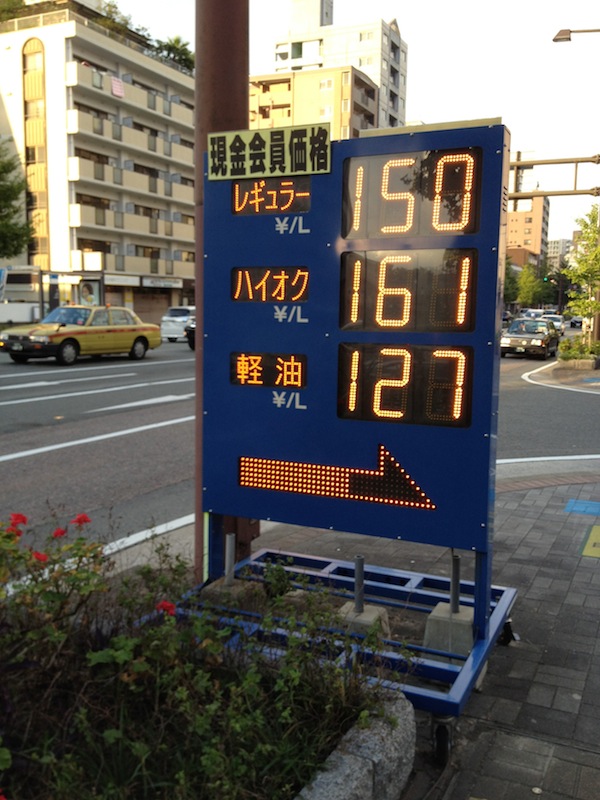
Once again we hear that gas prices have spiked to their highest levels ever in California. Gasoline in the Golden State now costs on average $4.67 per gallon, and as high as $6.65.
I'm afraid I don't have much empathy for the Californian driver. Compared to Japan, $4.67 per gallon sounds like a bargain.
The above picture was taken at my neighborhood "gasoline stand" (gas station) a few days ago. The prices listed are for cash purchases only and converted at today's (admittedly high) rate of 78 yen to the dollar† come to:
Regular $7.28 per gallon
Premium $7.81 per gallon
Diesel $6.16 per gallon
†With oil being traded in dollars, you'd think that would bring gasoline prices way down in Japan, but they have remained fairly constant over the years. I believe one reason for this is that since the stalling of Japan's nuclear reactors, the country has had to rely on oil and natural gas imports to fuel its power plants, thus increasing demand domestically and keeping prices high.
 Saturday, October 6, 2012 at 9:35AM
Saturday, October 6, 2012 at 9:35AM
Ten-madé Tobé (lit. Fly to Heaven)[1], the dive on the first floor of my apartment building, celebrated its 25th anniversary last night. When Ten Tobé, as it is affectionately known, opened a decade and a half ago at the height of the bubble economy, it was a wildly popular “no-pants coffee shop”. Hostesses wearing mini skirts and roller skates would glide about a floor covered in mirrors, giving the male customers a fleeting, yet titillating peak up their skirts as they skated by.[2]
The Ten Tobé of 2012 is a run-of-the mill snack, a bar where women pour drinks for and chat with their predominately male customers. Gone are the mirrors, the skates, the panty-less hostesses. From the point of hygiene, I suppose you could say the bar has greatly improved over the years, but I don’t think the men patronizing Ten Tobé these days are flying as high as heaven anymore.
[1] Ten-madé Tobé could also be translated as “Fly me to the Moon”.
[2] And people used to complain that the Japanese didn’t invent anything!
 Wednesday, September 26, 2012 at 9:46AM
Wednesday, September 26, 2012 at 9:46AM
The second (or fall) semester started up a week ago here and I'm trying to adjust to my new routine of waking at six and heading out the door by seven-twenty in the morning.
It doesn't always work out as planned, of course.
For one thing, there's our two-year-old son, Yu-kun, who is used to my being home most of the time. When I try to leave in the morning he insists that he has to work, too, and with tears streaming from his eyes, he begs me to take him. If I don't time my departure well--there's a window of opportunity when his favorite TV show comes on--the boy will escape down the hall in his diapers. He sometimes even climbs up the stairs to the seventh floor where I'll have to fetch him and bring him back, kicking and screaming, to our apartment. "I'm working, too! I'm working, too!" he bawls.
The other day as I handed the crying boy to my wife, she said, "You must like this." I had to admit that I did. Even if his affection is usually expressed in a kick to my jaw while I'm sleeping, these tantrums he has when I try to leave do make me feel loved.
Only once we manage to get the little animal back into his cage, can I finally leave. Often twenty minutes later than I had planned. (Oh well.)
As I have mentioned in previous posts, I work "full-time" (four days a week) at a women's junior college and "part-time" (one day) at a university. The junior college is about forty minutes away by train and bus and it is usually during this commute that I catch up on the news, by either reading The Economist or listening to some left-leaning podcasts, such as Hardball with Chris Matthews, The Rachel Maddow Show, Real Time with Bill Maher and Best of the Left. I balance that out with podcasts from NPR, PBS, and the BBC. Thanks to my iPhone, the commute is usually over before I know it.
At work, I try to get my writing done before doing anything work-related. Like a lot of authors, I tend to do my "best" writing in the morning when I'm most alert and have the fewest distractions.† Fortunately, that is not a tall order here at the college where most of the professors don't normally slink in until about noon. As most of my classes don't start until one or so in the afternoon, I could probably do the same, but that four- to five-hour block of uninterrupted quality writing time is more important to me than getting a few extra hours of sleep.
Anyways, the reason I'm writing today is that at the beginning of every semester when I meet my students, many of them for the first time, I am blown away by how tall some of them are getting. In my freshman class at the university, there are six boys (out of 23 students), four of whom are either as tall as or taller than me. At 177cm, I am, admittedly, no giant, but I'm not pint-sized either.
When I first came to Japan ages ago and would have to stand in a crowded train, I was more often than not the tallest person in the car. Over the past two decades, the heights (and weights) of both men and women in Japan, have changed so much that whereas I once had a clear view over the heads of all the other passengers, that view is now blocked by people who are, again, as tall as or taller than me.
Interestingly, when I went back to the States two summers ago and was riding Portland's light rail known as the Max, I told my wife to take a look around at the other passengers standing near us. I asked her if she noticed anything odd. She replied that everything about Americans was odd.
"Okay, okay," I conceded. "But look at how short everyone is. I am the tallest person on this street car."
I realize it's anecdotal evidence at best, but I believe there is something going on. Japanese are without a doubt getting bigger--both horizontally and vertically--and Americans are getting shorter (but, alas, not slimmer).
I have two students in one of my classes at the junior college who are Amazonians. One of them is 170cm tall. In heels, she's a good three to five centimeters taller than me. I asked her if her parents were also tall and she replied that, no, they were average height.
So, what's going on then?
My pet theory is the diet. And not necessarily what this current crop of 18-20 years old has been eating, but the kinds of foods their parents' and grandparents' generation also ate. There have been two, sometimes three, generations with "good" nutrition, diets that have more variety and meat in it. Increased consumption of both processed and imported foods probably has a lot to do with it, too. Hormones in imported meats may also have a hand in it.
Incidentally, Japanese children growing up during and immediately after the Pacific War, when malnutrition was rampant, were considerably shorter than those who grew up before WWII, an average of three centimeters for boys in urban areas. (Dower's Embracing Defeat, p92-93. Worth reading.) The older generation of Japanese, those in their seventies and eighties tend to be quite small. It's not uncommon to find a great grandmother who is literally half the size of her great grandchildren.
Below is a graph from the Ministry of Health, Labour and Welfare which shows the change in the heights (brown) and weights (green) of Japanese men and women in their 30s. Height is given in cm on the left, weight in kilograms on the right. The upper two lines are for men, the lower two lines are for women. Average height for 30-year-old men in 1945 was about 160cm. In 2005, that figure was 172cm. Women have gone from an average of 149cm (teeny-tiny!) to 158cm (still small). I would think the figure for women today in their 20s would be even higher.
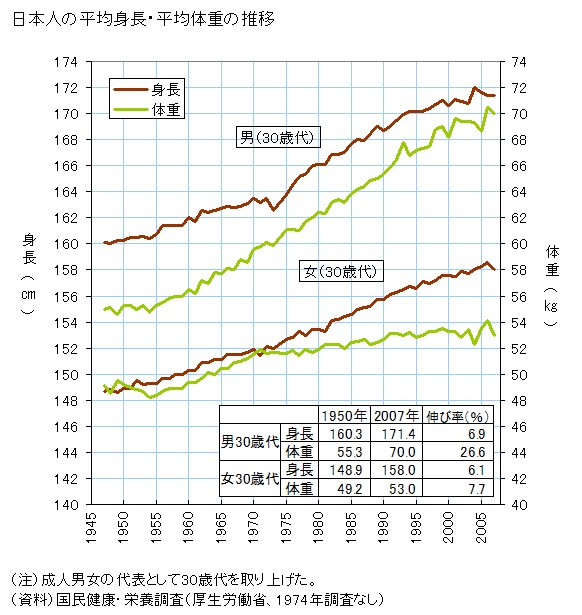
When I was trying to find data on the height changes, I found some interesting statistics. In one survey of 19 countries, South Koreans were found to be the tallest among the five Asian countries studied. (Men, 173.3cm; Women, 160.9cm). This probably won't surprise anyone who has been to the country. At 170.7cm for men and 157.9cm for women, the Japanese came in second. As for the country with the tallest people, the Netherlands took that honor. Again, no surprise there: the Dutch (Men, 182cm; Women, 170cm) are feckin' huge.
There is a lot of hand-wringing on the Internet, bloggers worried that the Japanese are no longer getting taller. The following graph shows the average heights of twenty year olds since the 1950s. 20-year-old men born in 1935 were on average 162.2cm tall; women, 150.6cm. Heights of twenty-two-year-olds apparently peaked at 171.8cm (♂) and 158.9cm (♀) in 1989 with those who were born in 1969.
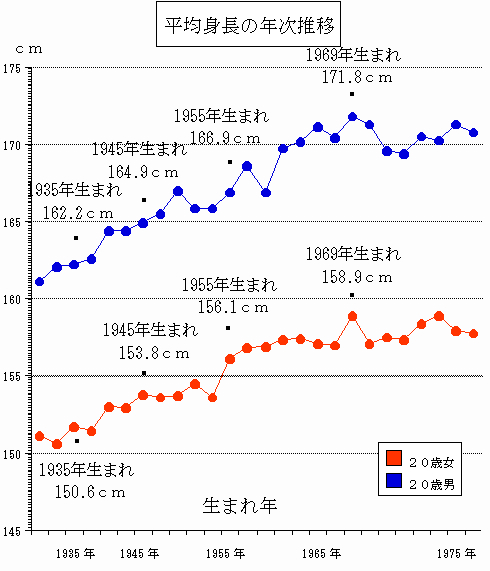
†During the months that school is off I'll usually do this at coffee shops in my neighborhood.
 Saturday, September 22, 2012 at 12:34PM
Saturday, September 22, 2012 at 12:34PM
Last week, I received the following inquiry about something I had posted a year ago:
I was looking around online trying to find a nice rice terrace (tanada) to visit on my trip to Japan in late October (how I found your blog), and I came upon the Ukiha tanada, which look amazing, but I am not sure if the rice will be around when I get there.
You're right.
Generally speaking, rice is harvested right about now in Ukiha and elsewhere. I've been there three times to see the higan-bana†, which are just starting to bloom here in Fukuoka, and each time I went most of the rice had already been cut. I suppose that if you were to hurry, there might still be rice left as the weather hasn't been very sunny this summer. (My wife just said that we will go harvest the rice we planted earlier this year later this week.)
Would you happen to be able to tell me how I could find that information out? I know it's kind of a long shot, but I've been googling everything I can think of, and no one can tell me (probably because the farmers don't put up their harvest schedule on the internet).
It usually depends on the weather more than anything. I would think that due to all the rain we've had this summer, the harvesting might be a week or two late. Even still, that would be too late for your planned visit.
I did a quick search in Japanese and found the following:
September is the season for harvesting rice. While the exact timing depends on the weather, as a rule, rice is harvested about forty-five days after after grains of rice appear on the iné (rice plants). There are other ways of determining whether a field is ready to be harvested. One is by looking at the field itself. If ninety percent of the field has turned golden in color (from the rice grains), then it is ready. Another way is know if it is ready is to calculate the average daily high and add it up. If that figure is between 1000 and 1200 degrees Celcius, then the rice can be harvested.
That's probably not very helpful for you, but I find it rather interesting.
Have you ever been to or heard of Misaki in Okayama? It also seems like a nice place to visit a tanada, and they say they harvest later than in the south...
No, I'm afraid I haven't. I doubt the timing would be much different. One thing I have noticed is that rice is usually planted and then harvested at higher elevations first.